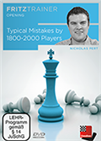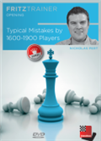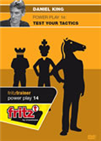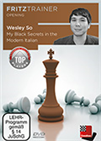Helping club players
Nicholas Pert is a National Head Coach for the English Chess Federation, which provides him with the opportunity to see first-hand, on regular basis, the typical mistakes that his lower rated trainees make and use his observations to compile these highly effective training tools. A comment by a young player’s parent best illustrates the usefulness of this style of learning material:
 On this DVD GM Nick Pert shows you typical mistakes by 1800-200 players. Themes as when to exchange pieces, how to convert an advantage, passive pieces, anticipating your opponents plan, openings and pawn structure are shown throughout the DVD.
On this DVD GM Nick Pert shows you typical mistakes by 1800-200 players. Themes as when to exchange pieces, how to convert an advantage, passive pieces, anticipating your opponents plan, openings and pawn structure are shown throughout the DVD.
I live in NYC and have a 10-year-old son, who’s been playing competitive chess for the past few years. He’s currently rated 1940 and working hard to break into the 2000s. We recently bought the new DVD “Typical Mistakes by 1800-2000 Players”, and it’s fantastic. My son has watched quite a few chess videos, but this is by far his favorite; the other day he said, “Lots of times I’m listening and thinking ‘What if he did this move’, and then on the video he starts describing exactly what I was wondering about”. Feedback from coaches has been that he tends to underestimate his opponents’ resources, so there were numerous segments in the DVD that are proving to be especially helpful for him.
One may think that there is a fine line between such close ranges of rating performances to separate the mistakes that typically occur. However, Pert manages to convince otherwise having carefully chosen examples to point to specific weaknesses in each of these levels of play.

All FritzTrainers by GM Nicholas Pert in the ChessBase Shop
Actually, these DVDs were made in a reversed order than one would expect: Nick first composed the higher rating ‘typical mistakes’ manuals, and only afterwards, encouraged by the positive reactions they garnered, he created the latest edition that focuses on mistakes made by much lower rated players, in this case raging from 1000-1600 Elo. It is this, the latest product that I tackle in this review.
In the introductory segment of the ‘Typical Mistakes by 1000-1600 Players’, Pert chose a game in which the following position happens:
 Some mistakes repeat themselves often in amateur games. With themes such as "Miscalculating Forcing Lines", "Being Too Materialistic" and "King Safety" Nick Pert shows you how to avoid making typical mistakes.
Some mistakes repeat themselves often in amateur games. With themes such as "Miscalculating Forcing Lines", "Being Too Materialistic" and "King Safety" Nick Pert shows you how to avoid making typical mistakes.
The White king is so precariously exposed and yet most of the pieces are still on the board! It is obvious that it is very early in the game. Another obvious thing is that such a position can only be achieved by a low rated player to whom a few character traits can be attached: impatient, overly confident, ignorant or disrespectful of the basic chess rules. The common weakness of low rated players is not just the lack of knowledge, but it has a psychological basis. They like to ‘jump’ prematurely and are quickly punished.
Respecting your opponent too much or too little and other weaknesses and behaviours proper to this rating range are addressed in collection of games throughout eight sections that treat basic chess themes:
 On this DVD Grandmaster Daniel King:
On this DVD Grandmaster Daniel King:
● demonstrates typical tactical patterns
● shows how strong players use their tactical awareness
● puts your tactical abilities to the test — but this is a test with a difference. Although the emphasis is on tactics, there are also positions that require a strategic solution. You don’t know what’s coming next...
- Forcing Moves
- Tactics
- Passive Play
- Defence
- Openings
- Endgame
- Attacking
- Pawn Structure
Each of these sections contain model games and analysed games coupled with interactive tests in which you can try to guess the correct move; if you don’t find it immediately you are given further chances and each time you have Pert’s voice explaining why it is not the correct move until you guess the best move.
To have a taste of the type of examples studied, I chose a game in which both players commit errors typical for their rating: in a position in which White has a clear advantage with a piece up, instead of maintaining a logical, steady play, he makes a risky, ‘flashy’ move, after which Black could have easily won — but neither has he seized the opportunity!
 The Italian Game is considered a sound but quiet opening without early trades, giving rise to rich positions where plans are more important than forced variations. So shows black's plans on this DVD.
The Italian Game is considered a sound but quiet opening without early trades, giving rise to rich positions where plans are more important than forced variations. So shows black's plans on this DVD.The last section is entitled ‘Beating Yourself’. Chess players at any level are prone to this debilitating error, but somehow lower rated players are ‘experts’ at it. It is when everything is going swimmingly, you have achieved an advantage, and then, for some inexplicable reason, you bring forth an odd move which ruins everything or, in Pert’s words, ‘beating yourself’. To wit, the following game in which Black has done quite well in the opening faze: a clear pawn up, king castled, no weaknesses, rooks nicely doubled — it is a position in which Black clearly has the upper hand.
At this stage, the normal move would be …♜xd4 which would lead to a favourable endgame for Black. But instead, Black just decided to beat himself for no reason and plays …♞d5 ‘allowing all kind of tricks’.
He soon ends up a piece down and then, when he could safely recapture …♜xd5, Black further worsens his position by ‘seeing a ghost’ and playing an unnecessary, defensive move …g6.
Throughout the game, Pert points to critical key moves and misplayed chances by both players. Likewise, similar patterns and treatment are applied in all his chosen examples, so that, as Pert says in his introduction: ‘… this DVD may not make you an infinitely stronger player but it may motivate you to practice your tactics and areas that need most work…’
Considering this FritzTrainer is aimed at class players not far from beginner level, I find, on occasions, Nick’s explanations of the lines are a tad too fast for untrained minds to absorb. Double concentration is needed (or generous use of the rewind button)! But, that in itself would be a useful exercise.
After the success of the Typical Mistakes videos aimed at higher rated players, I have decided to focus on mistakes that are made by players rated from 1000-1600.
Links
























